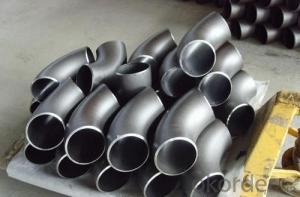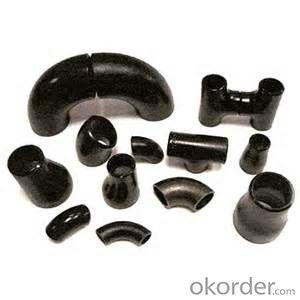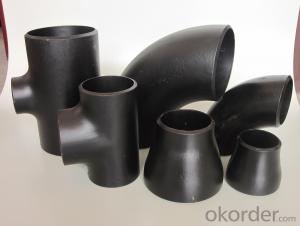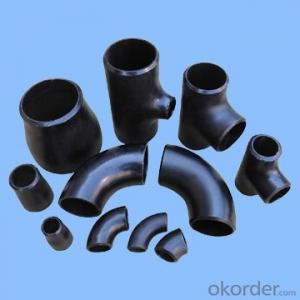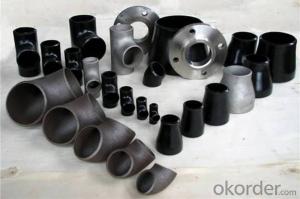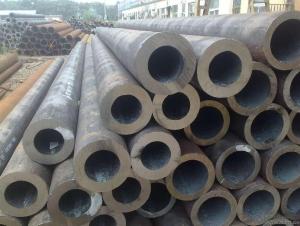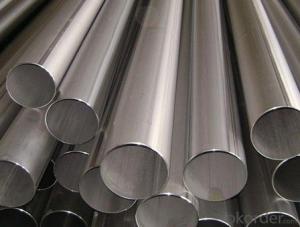5'' CNBM carbon steel pipe fittings ISO/ BS EN/DIN/ API
- Loading Port:
- Tianjin
- Payment Terms:
- TT OR LC
- Min Order Qty:
- 5 m.t
- Supply Capability:
- 300 m.t/month
OKorder Service Pledge
OKorder Financial Service
You Might Also Like
Products Detailed Description
Products | pipe fittings elbows, bends,tees, reducers caps |
Size | 1/2" - 48" |
Wall thickness | Sch5-Sch160 XXS |
Standard | ANSI, ASME API5L, OCT, DIN and JIS, etc. |
we can also produce according to drawing and standards provided by customers. | |
Material | Carbon steel, alloy steel and stainless steel. |
We can produce according to materials appointed by consumers. | |
Packaging | Plywood Cases,plywood pallet, plastic bag or as customers requirement |
Surface Treatment | Shot blasted, rust-proof black oil |
Delivery Time | 10-60 days |
Quality | First grade |
Others | 1.Special design available according to your drawing. |
2.anti-corrosion and high-temperature resistant with black painting | |
3. All the production process are made under the ISO9001:2000 strictly. | |
4. A conformity rate of ex-factory inspection of products. |
Specifications
Ansi B16.9 WPB carbon steel pipe fitting elbow tee reducer
Size:Seamless 1/2"-24" Welded 1/2"-48"
ANSI B16.9 WPB carbon steel pipe fitting elbow tee reducer
1.Size: Seamless 1/2"-24" Welded 1/2"-48"
2. WT: SGP, STD, SCH40, SCH80, SCH100,SCH120,SCH160,XS,XXS
3. Material:
stainless steel Grade: 201,304,304L,316,316L,317,317L,904L,and etc
carbon steel Grade: WPB,GRB, Q235,16MN
Alloy steel: st35.8,st52,wp11,wp22,wp12 wp l6
4. Standard: ASTM/AISI/DIN/JIS
5. Type: Concentric and eccentric
6. Surface treatment: Transparent oil, rust-proof black oil
7. Applications range: Applications range: for use in the petroleum, smelting, foodstuff, power, papermaking, chemical, medical equipment,aviation, boiler heat exchanger, and other fields
8. Packing: wooden case or as per customers' requirement
- Q: How do steel pipes compare to ductile iron pipes?
- Steel pipes and ductile iron pipes are both commonly used in various applications, but they have some differences in terms of their properties and advantages. 1. Strength and Durability: Steel pipes are typically stronger and more durable than ductile iron pipes. Steel has a higher tensile strength, making it less susceptible to cracking or breaking under pressure or external forces. Ductile iron, on the other hand, has a lower tensile strength but has better impact resistance than steel. 2. Corrosion Resistance: Steel pipes are prone to corrosion, especially when exposed to moisture or chemicals. However, they can be protected by applying coatings or using corrosion-resistant alloys. Ductile iron pipes, while inherently more corrosion-resistant than regular cast iron, may still require external protection to prevent rusting and degradation. 3. Flexibility: Ductile iron pipes have greater flexibility than steel pipes. They can withstand certain degrees of bending and deflection without fracturing, making them suitable for applications where ground movement or shifting might occur. Steel pipes are less flexible and more rigid, making them better suited for straight runs or applications with minimal movement. 4. Cost: Generally, ductile iron pipes are more cost-effective than steel pipes. Ductile iron is easier and cheaper to manufacture, resulting in lower production costs. However, steel pipes may have a longer lifespan, requiring fewer replacements over time, which can offset the initial cost difference. 5. Installation: Steel pipes are lighter and easier to handle during installation compared to ductile iron pipes, which can be heavy and bulky. The lighter weight of steel pipes can reduce labor and transportation costs. Additionally, steel pipes can be welded, allowing for more flexible installation options, while ductile iron pipes are typically joined using mechanical couplings or flanged connections. In summary, steel pipes offer superior strength and durability, while ductile iron pipes provide better flexibility and cost-effectiveness. The choice between the two depends on the specific requirements of the application, including factors such as corrosion resistance, expected loads, installation conditions, and budget constraints.
- Q: Can steel pipes be used for underground stormwater drainage?
- Indeed, underground stormwater drainage can utilize steel pipes. These pipes possess durability and boast a high strength-to-weight ratio, rendering them appropriate for subterranean usage. They can endure substantial burdens and fend off corrosion, thus guaranteeing sustained effectiveness within stormwater drainage systems. Furthermore, steel pipes lend themselves to easy welding, facilitating customization and flexibility during both design and installation. Nonetheless, it is imperative to implement adequate corrosion protection measures, such as the application of a protective coating or the utilization of corrosion-resistant alloys, to avert degradation over time. Regular maintenance and monitoring are also advisable to uphold the pipes' integrity and ensure optimal stormwater drainage functionality.
- Q: How are steel pipes used in the manufacturing sector?
- Steel pipes are used in the manufacturing sector for various purposes such as transporting fluids and gases, supplying water, and carrying out structural applications. They are commonly used in industries like oil and gas, construction, automotive, and aerospace for their durability, strength, and resistance to corrosion. Additionally, steel pipes are crucial in the manufacturing of machinery, equipment, and infrastructure, making them essential components in many manufacturing processes.
- Q: How are steel pipes used in the manufacturing of automotive exhaust systems?
- Steel pipes are commonly used in the manufacturing of automotive exhaust systems due to their durability, heat resistance, and ability to withstand corrosive gases. These pipes are utilized to transport and direct the exhaust gases from the engine to the rear of the vehicle. They are often bent and welded to create a complex system of pipes, mufflers, and catalytic converters, ensuring the efficient flow and treatment of exhaust gases while reducing noise levels.
- Q: How are steel pipes used in the manufacturing of food processing machinery and equipment?
- Steel pipes are commonly used in the manufacturing of food processing machinery and equipment due to their durability, corrosion resistance, and high strength. These pipes are used for various purposes such as fluid transportation, steam generation, and structural support in the machinery. They are also crucial for conveying liquids, gases, and other food ingredients safely and hygienically throughout the manufacturing process. Additionally, steel pipes can withstand high temperatures and pressures, making them ideal for applications like sterilization, pasteurization, and cooking in food processing machinery.
- Q: How are steel pipes insulated for thermal purposes?
- Various methods are commonly employed to insulate steel pipes for thermal purposes. One method frequently utilized involves wrapping the pipes with insulation materials like fiberglass, mineral wool, or foam. These materials act as a barrier between the pipe and its surroundings, effectively preventing heat transfer or loss. To ensure the proper insulation of steel pipes, the insulation material is typically tightly wrapped around the pipe, leaving no gaps or openings for heat to escape. Adhesive tapes or metal bands are then used to secure the insulation in place. In addition to external insulation, internal insulation can also be applied to steel pipes. This involves placing insulation material inside the pipe, creating a protective layer against heat loss or gain. Internal insulation is commonly utilized in situations where the pipe carries hot fluids or gases. Moreover, certain steel pipes are designed to incorporate a built-in insulation layer. These pipes, known as pre-insulated pipes, already come equipped with insulation material integrated into their structure. The insulation layer is typically made of foam or mineral wool and is covered with a protective outer layer, ensuring effective thermal insulation. The insulation of steel pipes for thermal purposes plays a critical role in various industries, including oil and gas, HVAC, and plumbing. Proper insulation helps to maintain the desired temperature of fluids or gases flowing through the pipes, preventing energy loss and enhancing overall efficiency.
- Q: How are steel pipes protected against ultraviolet (UV) radiation?
- Coatings or paints can be applied to steel pipes to protect them from ultraviolet (UV) radiation. These coatings are designed to resist the damaging effects of UV radiation, such as fading, chalking, or degradation of the steel. One common method of protection involves using UV-resistant paints or polymeric coatings that contain additives or pigments capable of reflecting or absorbing UV rays. These coatings not only shield the steel from UV radiation but also provide an extra layer of corrosion protection, increasing the pipes' lifespan. Another method used for UV protection is applying thermal insulation materials. These materials, such as foam or coatings with reflective properties, help reduce the impact of UV radiation on the steel pipes. By acting as a shield, they prevent direct exposure to UV rays and minimize potential damage from prolonged exposure. It's essential to consider various factors, including the specific application, environmental conditions, and desired durability of the steel pipes, when choosing a UV protection method. Seeking advice from experts in the field can help determine the most suitable solution for a particular project or application.
- Q: What are the different types of steel pipe supports for high-temperature applications?
- There are several types of steel pipe supports that are suitable for high-temperature applications. Some common options include adjustable steel pipe supports, rigid steel pipe supports, spring hangers, and constant supports. These supports are designed to withstand the elevated temperatures and ensure the stability and proper alignment of the pipes.
- Q: What steel pipes are buried for outdoor heating pipes? Seamless or welded tube? Are there any rules for specific countries? Can use the seamed tube?
- Screw on the line, mainly anti-corrosion and insulation, seamless pipe caliber restrictions, so the price is high, with the most affordable screw can meet the requirements, 377 and 273 of the spiral 3920 yuan / ton, straight seam is about 4350
- Q: How are steel pipes protected against external moisture?
- Steel pipes can be safeguarded against external moisture in various ways. One commonly employed method involves applying a protective coating or paint to the pipe's surface, which acts as a barrier to prevent direct contact with moisture. Depending on the specific requirements and environment, this coating can be composed of different materials like epoxy, polyethylene, or zinc. Another means of protection is through the utilization of corrosion inhibitors. These inhibitors are added to either the internal or external surfaces of the pipes, creating a protective layer that hinders moisture-induced corrosion. Chemicals like rust converters or rust preventatives are examples of corrosion inhibitors that react with the steel, forming a protective barrier. Cathodic protection is an additional technique utilized to shield steel pipes from external moisture. This technique involves the use of sacrificial anodes or impressed current to generate an electric current that safeguards the steel. Sacrificial anodes, typically made of zinc, aluminum, or magnesium, are attached to the steel pipes and corrode over time instead of the steel, thereby preventing moisture-induced corrosion. Moreover, proper insulation and waterproofing measures play a vital role in protecting steel pipes from external moisture. To provide an extra layer of protection and prevent moisture infiltration, insulation materials like foam or tape are applied to the pipes. Waterproofing measures such as sealants or membranes can also be implemented to ensure no moisture seeps into the pipes. Regular maintenance, including inspections and repairs, is crucial for ensuring the continuous protection of steel pipes against external moisture. By promptly addressing any areas of damage or corrosion, the integrity of the protective measures can be maintained, thereby extending the lifespan of the steel pipes and avoiding costly repairs or replacements in the future.
Send your message to us
5'' CNBM carbon steel pipe fittings ISO/ BS EN/DIN/ API
- Loading Port:
- Tianjin
- Payment Terms:
- TT OR LC
- Min Order Qty:
- 5 m.t
- Supply Capability:
- 300 m.t/month
OKorder Service Pledge
OKorder Financial Service
Similar products
Hot products
Hot Searches
Related keywords
